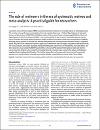The role of reviewers in the era of systematic reviews and meta-analysis: A practical guide for researchers
| Author | Begagić, Emir |
| Author | Skenderi, Faruk |
| Author | Vranić, Semir |
| Available date | 2025-10-27T05:46:50Z |
| Publication Date | 2026-07-20 |
| Publication Name | Biomolecules and Biomedicine |
| Identifier | http://dx.doi.org/10.17305/bb.2025.12979 |
| Citation | Begagić, E., Skenderi, F., & Vranić, S. (2025). The role of reviewers in the era of systematic reviews and meta-analysis: A practical guide for researchers. Biomolecules and Biomedicine, 26(1), 40. |
| ISSN | 2831-0896 |
| Abstract | A systematic review with meta-analysis (SRMA) represents the pinnacle of evidence, but its validity depends on methodological rigor. This narrative review synthesizes recommendations from major reporting frameworks—Preferred Reporting Items for Systematic Reviews and Meta-Analyses 2020 (PRISMA-2020), Meta-Analysis of Observational Studies in Epidemiology (MOOSE) and Preferred Reporting Items for Overviews of Reviews (PRIOR)—into a concise checklist for peer reviewers. The checklist addresses common sources of bias that often escape editorial assessment. Initially, it outlines how reviewers should assess the rationale for an SRMA by identifying existing syntheses on the same topic and determining whether the new work provides substantive novelty or a significant update. Best practices are summarized for protocol registration, comprehensive search strategies, study selection and data extraction, risk-of-bias evaluation, and context-appropriate statistical modeling, with a specific focus on heterogeneity, small-study effects, and data transparency. Case examples highlight frequent pitfalls, such as unjustified pooling of heterogeneous designs and selective outcome reporting. Guidance is also provided for formulating balanced, actionable review comments that enhance methodological integrity without extending editorial timelines. This checklist equips editors and reviewers with a structured tool for systematic appraisal across clinical disciplines, ultimately improving the reliability, reproducibility, and clinical utility of future SRMAs. |
| Language | en |
| Publisher | the Association of Basic Medical Sciences of Federation of Bosnia and Herzegovina |
| Subject | bias guideline adherence meta-analysis reproducibility of results risk assessment SRs Systematic reviews |
| Type | Article |
| Issue Number | 1 |
| Volume Number | 26 |
Files in this item
This item appears in the following Collection(s)
-
Medicine Research [1921 items ]


